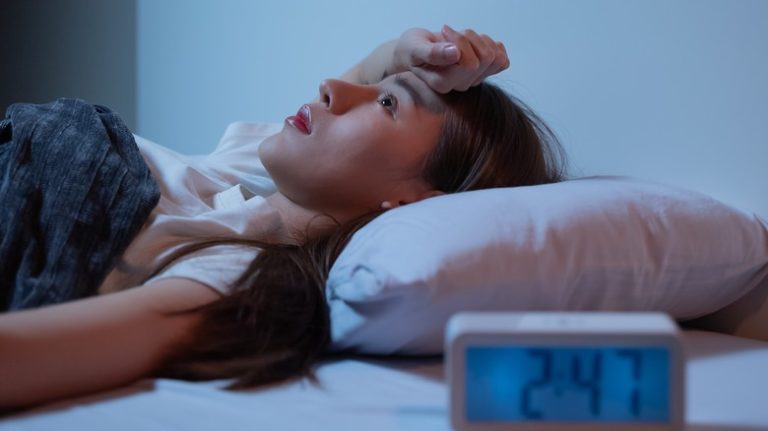When we move in with our partners, we rarely ever think about the sleeping arrangement being a topic of concern. In fact, over many generations, it’s become understood that a couple sleeps together in one bed, preferably also sharing one blanket.
Over time, though, one of the downsides of living with someone is starting to realize how your partner sleeps. Do they snore? Do they have restless legs syndrome? Do they wake up every few hours to go pee (and make a big noise while doing so)? What about the time they go to bed — or how early they wake up for work? Do they have a shift work schedule that is the total opposite of your own work routine?
Up until recently, people may have still slept in the same bed (and compromised their sleep quality). But according to a new survey done by the American Academy of Sleep Medicine (AASM), more than one-third of Americans are apparently occasionally or frequently sleeping in another room from their significant other. Also called “sleep divorce,” this trend has seen growing popularity on social media platforms like TikTok. What exactly is a sleep divorce?
A sleep divorce is about prioritizing sleep
Sleep divorced at 24 💀 #mattandabby
♬ original sound – Matt & Abby
Watch on TikTok
As explained by the AASM, “Although the term ‘sleep divorce’ seems harsh, it really just means that people are prioritizing sleep and moving into a separate room at night when needed.”
While the term itself may raise some eyebrows (especially from older generations or family members), the idea behind it is pretty simple. It’s about identifying one of the things you didn’t realize were ruining your sleep — your partner and your sleep incompatibility — and making a proactive change in your sleeping arrangement to rectify that situation. You choose to sleep in separate beds in the same room (or separate bedrooms altogether) for the betterment of your physical, mental, and relational health.
Karen Asp, who wrote about her own sleep divorce experience with her significant other for Real Simple, shared, “Confession: Besides hiring someone to help clean my house, getting a sleep divorce is perhaps the best thing I’ve done for my sleep, my marriage, and my health.”
A sleep divorce could get you quality (and quantity) of sleep

The health benefits of getting seven or more hours of sleep as an adult are too far-reaching to ignore. As explained by Sleep Foundation, there’s a lot more than a hazy or restful snooze that occurs when we go to sleep.
The typical sleep cycle takes us through four different stages – stage 1 NREM, stage 2 NREM, stage 3 NREM, and REM — and each stage has a unique purpose. Caitlin Tynan Doyle Professor of Neurology at Columbia University Medical Center, Carl W. Bazil told NBC News, “Your brain is actually very active during sleep doing important things — it’s not just resting. And if you don’t get sleep, you don’t function on a number of levels the way you should.” From sorting through your day’s memories to repairing your muscles and fueling your brain, sleep does a lot for your health.
The recommended hours of sleep people typically need to get each night (and the quality of it) can be severely hampered if you and your partner aren’t sleep-compatible. And this is when a sleep divorce could be a good idea.
A sleep divorce could keep you from getting sick

Fizkes/Getty Images
Sleep deprivation has been linked with several health conditions like high blood pressure, a weak immune system, obesity, heart issues, memory problems, risk of diabetes, etc. according to Healthline.
Not sleeping enough can mess with the hormones that control hunger — ghrelin and leptin — and can lead to overeating, per Sleep Foundation. A lack of sleep can also disrupt the natural process by which your heart rate slows down. This can lead to high blood pressure and put you at risk for heart disease or stroke. Also, as explained by sleep medicine specialist Yvonne Chu, “Studies have shown that those who chronically get less than seven hours of sleep a night are three times as likely to develop the common cold compared to those who routinely get eight hours or more of sleep” (via Yale Medicine).
Have you ever wondered why you struggle to recall things or focus on anything after a poor night’s sleep? That’s because proper sleep enables the organization and consolidation of memories. A full night of sleep also boosts creativity, learning ability, and concentration. It’s an overall prerequisite for better cognitive performance.
You improve relational heath when you prioritize sleep

Aleksandargeorgiev/Getty Images
It’s common to feel moody after a poor night’s rest. Sleep divorce can be a good idea if you’re consistently waking up this way. While some may think sleeping in separate rooms might be a gateway to separation, many who’ve tried the sleeping arrangement share that it’s actually brought them together.
Getting quality sleep means allowing the four stages of sleep to repeat cyclically until it’s time for you to wake up. If your partner’s snoring wakes you up in the middle of the night — or their shift work schedule wakes you a lot earlier than you’d planned — you probably won’t be in a good mood when you wake up. According to Khosla (via American Academy of Sleep Medicine), “We know that poor sleep can worsen your mood, and those who are sleep deprived are more likely to argue with their partners. There may be some resentment toward the person causing the sleep disruption, which can negatively impact relationships.”
Also, sleeping in separate rooms may boost feelings of longing between couples. Daryl Ausin, who shared his own experience in the Los Angeles Times, documented how the decision has built intimacy in their marriage. “Nights apart are the only time we actually get to feel a longing for the other person. That longing results in a happy reunion every morning, a sort of ‘fresh start’ button we push at the dawn of every day,” he wrote.
How to try sleep divorce if you’re interested

Sdi Productions/Getty Images
It might be helpful to consider why you want to sleep in separate bedrooms to begin with. If you’re trying to avoid intimacy or you’re feeling estranged from your partner for reasons other than sleeplessness, you may want to try couple’s therapy first.
Often, one partner might be considering a sleep divorce before the other does, so it’s best to assess how your partner might feel if you bring up the topic. Try seeking medical advice for concerns like sleep apnea or restless legs syndrome, especially if you or your partner loves cuddling and going to bed together. As shared by board-certified physician and professor of neurology, Nathaniel Watson (via Real Simple), “It’s important to consider the reasons for a sleep divorce, as many of the issues may signal a sleep disorder that can be addressed with proper diagnosis and treatment.”
Finally, approaching the topic would require compassion, lack of judgment, and a unified approach, according to experts. You don’t want to make your partner feel like they’re a burden. Licensed clinical psychologist and director of sleep health at Sleepopolis, Shelby Harris, says (via CNBC) “You have to make the choice consciously together. It can’t be a reactive thing like, ‘You snore so much, so I’m just going to sleep somewhere else,’ or kicking one person out of the bedroom.” Make sure both spaces are equally comfortable and both parties can get a good night’s rest with the new arrangement.



